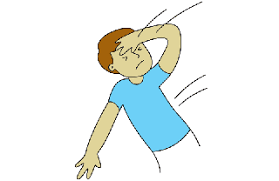
Syncope, also known as fainting is a loss of consciousness and muscle strength characterized by a fast onset, short duration, and spontaneous recovery. It is caused by a decrease in blood flow to the brain, usually from low blood pressure.
Fainting
This is also called as syncope, fainting happens when your brain does not get enough oxygen. You lose consciousness, or “pass out,” for a brief time (usually just a few seconds or minutes).
Symptoms:
· Lightheaded
· Dizzy
· Weak
· Nauseated
· Sweaty
Causes:
· Standing for long periods of time
· Heat exposure
· Seeing blood
· Having blood drawn
· Fear of bodily injury
· Straining, such as to have a bowel movement
Preventions:
· Diabetes
· Irregular heartbeat, or blockages in or near the heart that prevent the blood from getting to the brain
· Anxiety or panic disorders
· Dehydration
· Low blood sugar.
Treatment: In most cases of vasovagal syncope, treatment is unnecessary.
Fainting, syncope, oxygen, brain